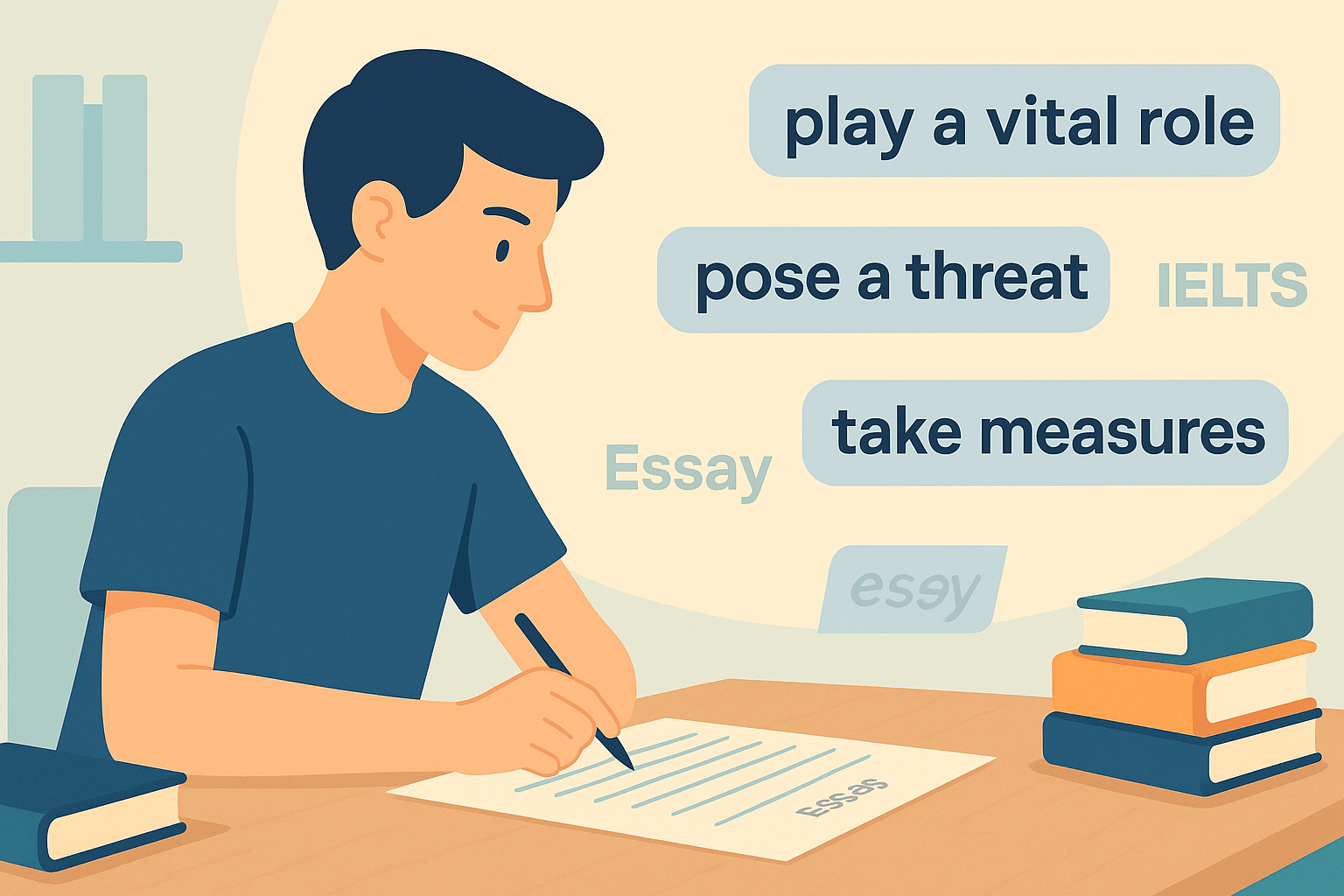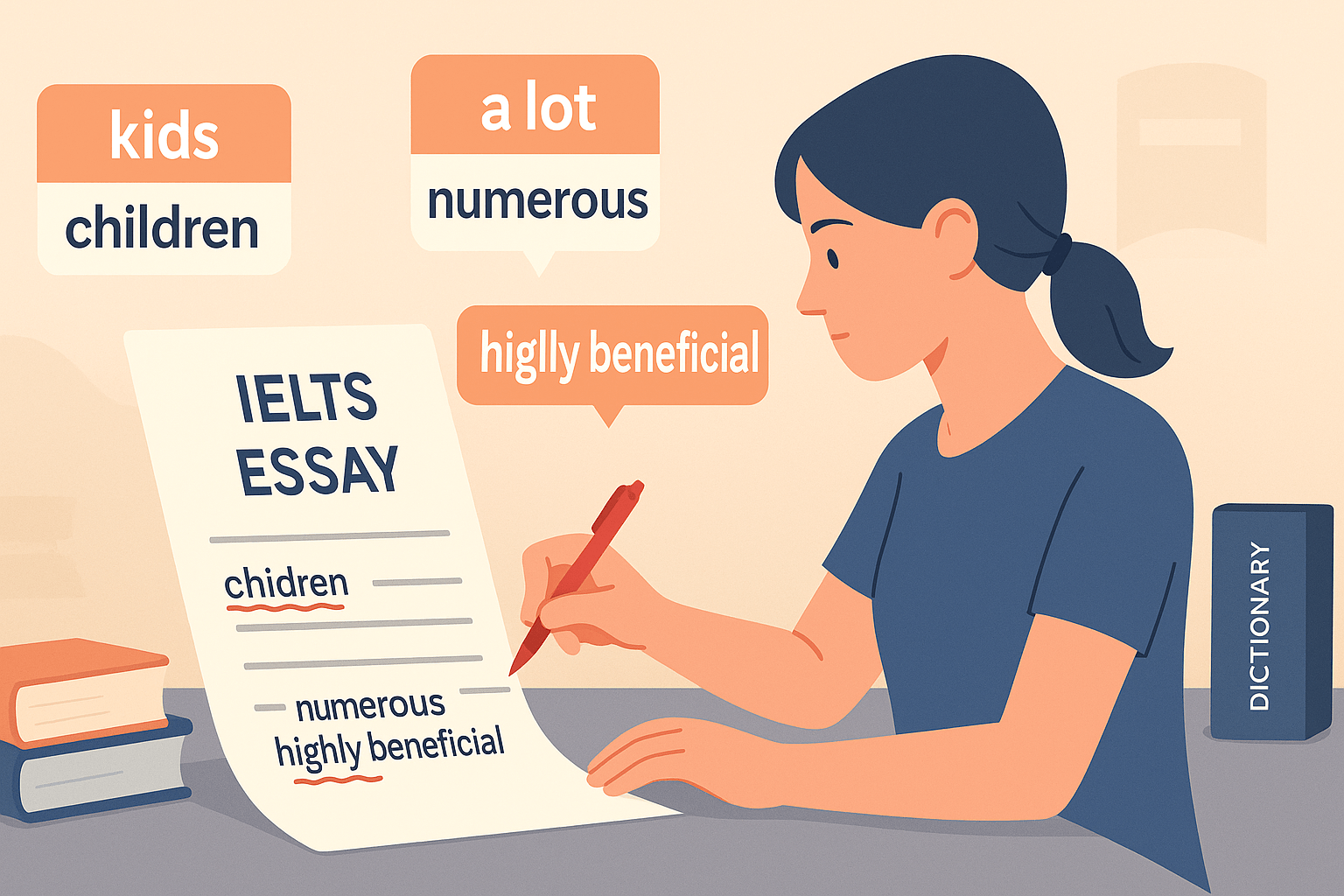When I teach IELTS Writing Task 2, one question I often hear from my students is: “How do I express my opinion clearly in an IELTS essay and still sound formal?”
The key is to use IELTS opinion essay vocabulary—a set of academic words and phrases that help you agree, disagree, or partially agree in a formal, examiner-friendly way.
In this guide, I’ll show you:
- ✅ Essential vocabulary for agree/disagree essays
- ✅ Persuasive expressions to present your opinion naturally
- ✅ Teacher tips to avoid informal or repetitive language
If you want to strengthen your overall Task 2 vocabulary, start with my IELTS Writing Task 2 Vocabulary for Band 7–9—this is the pillar resource for building a strong lexical foundation.
Why IELTS Opinion Essay Vocabulary Matters
Opinion essays—also called agree/disagree essays—are among the most common Task 2 questions.
Examiners evaluate your ability to:
- Present a clear opinion
- Support it with logical arguments
- Use formal academic vocabulary
Without the right phrases, your essay might sound informal or repetitive, which can hurt your Lexical Resource and Coherence and Cohesion scores.
AEO Answer Snippet:
IELTS opinion essay vocabulary consists of formal phrases that help candidates express agreement, disagreement, or partial agreement clearly and persuasively.
For official scoring guidance, check:
Essential IELTS Opinion Essay Vocabulary
Here’s my teacher-approved list of vocabulary for agree/disagree essays, divided into useful categories.
1. IELTS Opinion Essay Vocabulary for Stating Your Opinion (Agree/Disagree)
Use these formal expressions to introduce your viewpoint:
- I firmly believe that…
- From my perspective…
- It is my conviction that…
- I strongly agree that…
- I completely disagree with the idea that…
- In my view…
Example:
“I firmly believe that renewable energy is crucial for sustainable development.”
2. Vocabulary for Agreeing Formally
When you support the statement, use these polished expressions:
- There is no doubt that…
- I fully support the idea that…
- I am inclined to agree that…
- This essay strongly agrees that…
Example:
“I am inclined to agree that online learning has transformed modern education.”
3. Vocabulary for Disagreeing Formally
When you disagree with the statement, choose these academic phrases:
- I do not share the view that…
- I strongly disagree with the argument that…
- This essay takes the opposite view that…
- It would be incorrect to claim that…
Example:
“I strongly disagree with the argument that social media brings only positive effects.”
4. Persuasive Words and Phrases to Strengthen Opinions
Your essay should convince the examiner. Use persuasive connectors and academic intensifiers:
- For emphasis: undeniably, undoubtedly, without question
- For persuasion: crucial, essential, inevitable, fundamental
- For evaluation: beneficial, detrimental, significant, concerning
Example:
“Undoubtedly, stricter traffic laws are essential to improve road safety.”
5. Phrases for Balancing or Partially Agreeing
Sometimes, you might partially agree. These expressions help present a balanced view:
- While it is true that…
- Although I agree to some extent…
- This essay partly agrees that…
- It is undeniable that…, however…
Example:
“Although I agree to some extent that advertisements can be informative, they often manipulate consumer behavior.”
Teacher Tips for Using Opinion Vocabulary Effectively
I’ve seen many students lose marks by misusing or overusing opinion phrases. Here’s how to avoid that:
1. Be Natural and Context-Aware
Don’t force an expression where it doesn’t belong.
❌ I firmly believe pollution is exist. (Incorrect and unnatural)
✅ I firmly believe that stricter environmental policies are necessary. (Correct and formal)
2. Combine with Linking Words and Academic Vocabulary
Opinion phrases are powerful, but they work best with cohesive devices and topic vocabulary.
Example:
“I firmly believe that investing in renewable energy is crucial. Moreover, this approach significantly reduces carbon emissions.”
3. Avoid Informal Language
Do not use phrases like:
- “I think this is good”
- “I feel like it’s bad”
Instead, upgrade them to:
- I strongly believe that this policy is beneficial.
- I completely disagree with the claim that it is harmful.
Sample IELTS Opinion Essay Sentence
“I firmly believe that governments should invest in public transportation because it significantly reduces traffic congestion and environmental pollution.”
Notice how the sentence:
- Starts with a formal opinion phrase
- Uses persuasive academic vocabulary
- Clearly shows the stance to the examiner
Quick Practice Exercise
Rewrite this informal sentence using IELTS opinion essay vocabulary:
“I think using smartphones in class is bad.”
Suggested Answer:
“I strongly disagree with the practice of using smartphones in class, as it can have detrimental effects on learning focus.”
FAQ Section
Q1: How do I start an IELTS opinion essay?
Start with a clear opinion statement using formal phrases like “I firmly believe that…” or “From my perspective…”.
Q2: Can I use “I think” in IELTS Writing Task 2?
It’s better to avoid casual language. Use IELTS opinion essay vocabulary like “I strongly believe” instead.
Q3: How many opinion phrases should I use?
Use 2–3 strong opinion statements naturally in your essay—one in the introduction, one in the body, and one in the conclusion.
Conclusion
Using the right IELTS opinion essay vocabulary can transform a simple agree/disagree essay into a Band 7–9 response.
When you:
- Start with a formal opinion phrase
- Support your ideas with persuasive and academic words
- Maintain clarity and cohesion throughout your essay
… you show examiners that you are a confident and formal writer ready for a high band score.
🔗 Next step: Combine these opinion expressions with the academic vocabulary in our IELTS Writing Task 2 Vocabulary for Band 7–9 to maximize your writing score.






4 Responses
I feel this is one of the so much important info
ffor me. And i’m happy studying your article. But waant to statement
on some basic issues, The web site taste is great,the articles is actually nice : D.
Just right task, cheers
Allso visit my web site; Eric
I’ve read some good stuff here. Definitely value bookmarking for revisiting.
I surprise how so much effort you set to make any such magnificent informative web site.
video conferencing systems
Hi there! I just wish to offer you a big thumbs
up for your great info you’ve got here on this
post. I am coming back to your site for more soon.
historic landmarks in Gawler
It is not my first time to pay a visit this website, i am browsing this web page dailly and take
pleasant facts from here everyday.